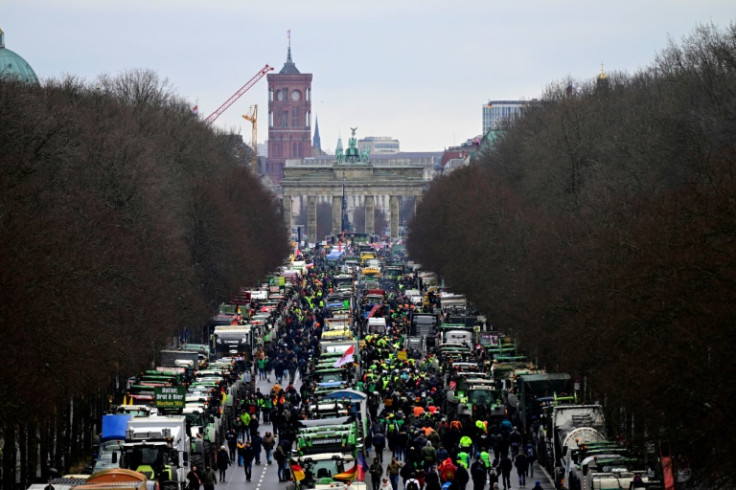
The German government slashed its growth forecast for 2024 on Wednesday, warning that Europe's largest economy was in "difficult waters" as it faced a series of headwinds.
Output is now seen expanding by a mere 0.2 percent this year, government spokesman Steffen Hebestreit said at a Berlin press conference.
Last autumn, the government was still expecting 1.3 percent growth.
The country ended 2023 in recession, shrinking by 0.3 percent, and the latest data suggest the first quarter of 2024 will see another contraction.
"The German economy is still in difficult waters," Hebestreit told reporters.
High interest rates, weaker demand and "geopolitical crises" including conflicts in the Middle East and Ukraine were just some of the challenges confronting Germany, he added.
Economy Minister Robert Habeck will unveil details of the latest economic report later on Wednesday.
According to media reports, it will show that Germany risks facing anaemic growth up to 2028 if no action is taken.
The German economy, Europe's largest and traditionally a driver of eurozone growth, is being buffeted by "a perfect storm", Habeck said earlier this month.
Germany's once-mighty industrial sector has been hit particularly hard by multiple headwinds.
Having previously relied on cheap Russian gas imports, the sector is still reeling from the energy price surge triggered by Russia's invasion of Ukraine.
The European Central Bank's streak of interest rate hikes to tame inflation has added to the pain, dampening demand and investments.
Exports have slumped on weaker trading with key markets such as China, which increasingly produces its own goods. Geopolitical tensions including shipping disruptions in the Red Sea have added to trading woes.
The long-promised shift to a greener economy meanwhile, requiring major public and private investment, has run into fresh hurdles after a shock legal ruling last year forced the government to rethink some of its climate spending plans.
German chemical giants BASF and Bayer were among some 60 companies this week issuing a joint appeal to European Union leaders to adopt a "European industrial deal" to help pull the sector out of the doldrums.
"Without a targeted industrial policy, Europe risks becoming dependent even on basic goods and chemicals. Europe cannot afford this to happen," the statement read.
But the three parties that make up Chancellor Olaf Scholz's coalition of the Social Democrats, the Greens and the liberal FDP, are at odds over how to respond.
Finance Minister Christian Lindner from the pro-business FDP wants to ease the tax burden and cut red tape for businesses.
"If we do nothing, Germany will become poorer," he has warned.
A draft law that would reduce taxes on corporations was being debated by lawmakers on Wednesday, but months of squabbling has seen the expected impact reduced from around seven billion euros ($7.5 billion) a year in tax relief to around three billion euros.
Economy Minister Habeck, from the ecologist Greens, wants to go further.
He has called for a relaxation of the government's constitutionally enshrined "debt brake", a self-imposed cap on annual borrowing that critics say has hampered much-needed spending on modernising infrastructure and financing environmentally-friendly projects.
Tensions over the brake spiralled after a top court in November found that the government broke the debt rule when it transferred billions of euros earmarked for pandemic support into a climate fund, throwing Scholz's budget into disarray.
While Scholz's Social Democrats have since signalled an openness to tweaking the rules, any loosening of the debt brake remains a red line for the FDP.
The economic headwinds have contributed to a steep decline in support for the government.
Plans to scrap agricultural fuel subsidies triggered nationwide tractor protests last month, with many farmers voicing dissatisfaction with Scholz and his coalition partners.







